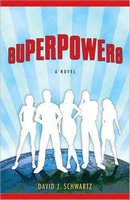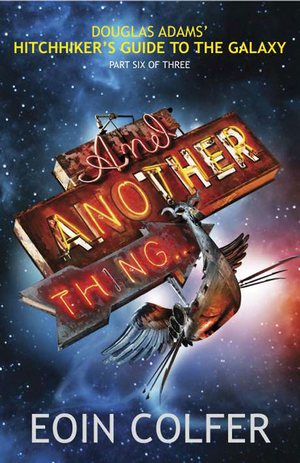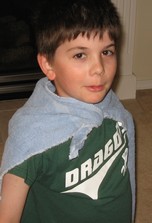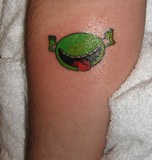 If one’s going to write about superheroes there’s really only so much you can do–A. Write a prose equivalent of a comic book or B. Go out of your way to make sure that no once can describe your work as an example of “A.” Typically, the “A” books are shoddy, and wouldn’t be accepted as a script by a decent comic publisher; and the “B” books are so caught up in not being “A”s that they lose something–they might do well exploring the nature of “heroes” or satirizing/politicizing the genre or whatever, but they don’t work as novels.
If one’s going to write about superheroes there’s really only so much you can do–A. Write a prose equivalent of a comic book or B. Go out of your way to make sure that no once can describe your work as an example of “A.” Typically, the “A” books are shoddy, and wouldn’t be accepted as a script by a decent comic publisher; and the “B” books are so caught up in not being “A”s that they lose something–they might do well exploring the nature of “heroes” or satirizing/politicizing the genre or whatever, but they don’t work as novels.
I’ve had my fill of the “B”s lately, and think I’ve finished only one out of the handful I’ve started in the last couple of years–Tom De Haven’s It’s Superman, which really did work as a novel. Schwartz’ Superpowers: A Novel, stands as an example of how to do an “A” right.
Superpowers is the origin story of a super-hero team from Madison, Wisconsin, of all places. A group of college students one day find themselves with superpowers (super-strenghth/invulnerability; super-speed; invisibility; telepathy; and power of flight), and it doesn’t take too long before they decide to don costumes and fight crime as the All-Stars, despite the very clear absence of any super villainy. A solid, “A” start–and if Schwartz kept at it at this level, I’d probably really have enjoyed the read.
He did a great job of focusing on each of the five heroes in turn, never focusing on one for too long, essential to any good team book (unlike the Justice League, which all to0 frequently turns into Superman and some other guys (or Batman and…;or Wonder Woman and…; or…). The early chapters are told with a solid amount of humor–think the early parts of the Spider-Man movie, where Peter’s learning about his powers. And like I said, if he’d kept it there, Schwartz would’ve produced a fun read.
But he didn’t, and he made it a better read.
There’s a cost to these powers for each character–personal, vocational, mental, physical, familial and/or academic. Each one had a full life before tacking on crime-fighting. And life keeps going on–new changes, challenges, and developments–it’s possible that a decent story could’ve been told about these five and their associates without the powers. So they’re having to grow as people, as well as nascent heroes.
Then a few short months after receiving their powers, well–don’t want to give it away, but something happens hundreds of miles away from them that their powers can’t help. The public as a whole isn’t sure what to make of anyone being a super-hero (particularly the police). This is worsened when they make a couple of mistakes that wreak havoc on civilians.
The book is really about how people react to these powers, the costs, and the events surrounding them. The plot doesn’t depend on a super villain or three for conflict–conflict and drama come from living–lLaughter, love, anger, pain, ambition, parent-child relationships (of varying degrees of health/disfunction), hatred, fear, revenge…
These are not paragons of virtue, Schwartz depicts them as people. That’s what makes the book worth the time. While I was reading it, I kept saying to myself “If Robert Kirkman or Brian Michael Bendis wrote a novel, it would read like this.” Come to think of it, for my comic reading friends, that’s probably all I had to say in this post (a much more economical way to say everything I just did). If you’re not one of my comic-reading friends, and you want to be–read this book, and if you like it, go pick up the trade paperbacks of Ultimate Spider-Man and Invincible.
You can thank me later.









 If one’s going to write about superheroes there’s really only so much you can do–A. Write a prose equivalent of a comic book or B. Go out of your way to make sure that no once can describe your work as an example of “A.” Typically, the “A” books are shoddy, and wouldn’t be accepted as a script by a decent comic publisher; and the “B” books are so caught up in not being “A”s that they lose something–they might do well exploring the nature of “heroes” or satirizing/politicizing the genre or whatever, but they don’t work as novels.
If one’s going to write about superheroes there’s really only so much you can do–A. Write a prose equivalent of a comic book or B. Go out of your way to make sure that no once can describe your work as an example of “A.” Typically, the “A” books are shoddy, and wouldn’t be accepted as a script by a decent comic publisher; and the “B” books are so caught up in not being “A”s that they lose something–they might do well exploring the nature of “heroes” or satirizing/politicizing the genre or whatever, but they don’t work as novels.





